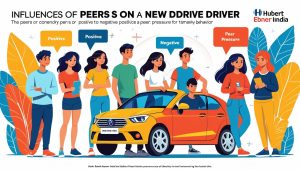How Stress Impacts Driving Decisions
Introduction
Driving is not just a physical activity—it’s a mental one. A driver under stress is more likely to make impulsive, poor, or even dangerous decisions. In India’s high-pressure traffic environment, understanding the link between stress and driving is essential for reducing accidents and promoting road safety.
What Causes Stress While Driving?
Common stress triggers among Indian drivers include:
- Heavy traffic and congestion
- Time pressure or tight delivery schedules
- Honking and aggressive driving from others
- Personal or work-related tension
- Poor road conditions or weather
- Fatigue and lack of rest
Even experienced drivers are vulnerable when stress levels spike.
How Stress Affects Driving Decisions
🧠 1. Reduced Concentration
Stress can overload the brain, making it harder to focus on road signs, mirrors, or pedestrians.
⚡ 2. Slower or Poor Reaction Time
In a stressed state, drivers may overreact (e.g., sudden braking) or underreact (e.g., late lane changes).
😠 3. Aggressive Driving Tendencies
Stress often leads to impatience, road rage, tailgating, and risky overtakes.
🔄 4. Impaired Judgment
A stressed driver may misjudge speed, distance, or the behavior of other vehicles.
😵 5. Tunnel Vision
Anxious or stressed drivers tend to fixate on one threat and ignore peripheral hazards.
The Impact on Fleet Safety
For professional drivers, stress can lead to:
- Increased accident frequency
- Missed delivery schedules
- Higher fuel consumption (due to erratic driving)
- Penalties or insurance issues
- Long-term mental health issues
How Hubert Ebner India Addresses Driver Stress
Our training goes beyond vehicle handling. We focus on driver wellness and behavior:
🧘♂️ Stress Management Workshops – Breathing, focus techniques, and emotional control
📊 Telematics-Based Insights – Identifying stress-induced driving patterns
🎯 Mindfulness & Safety Awareness Modules
💬 Counseling & One-on-One Coaching
📚 Fatigue and Sleep Hygiene Education
We help organizations ensure that their drivers are not just skilled—but also mentally equipped to make smart, safe decisions.
Conclusion
A stressed mind is a risky driver.
Improving emotional control is just as important as mastering the controls of a vehicle. Investing in stress management can transform safety standards for your fleet and staff.
Call to Action
Want to reduce stress-related incidents in your fleet or team?
Partner with Hubert Ebner India for holistic driver training that blends skill, psychology, and wellness.




